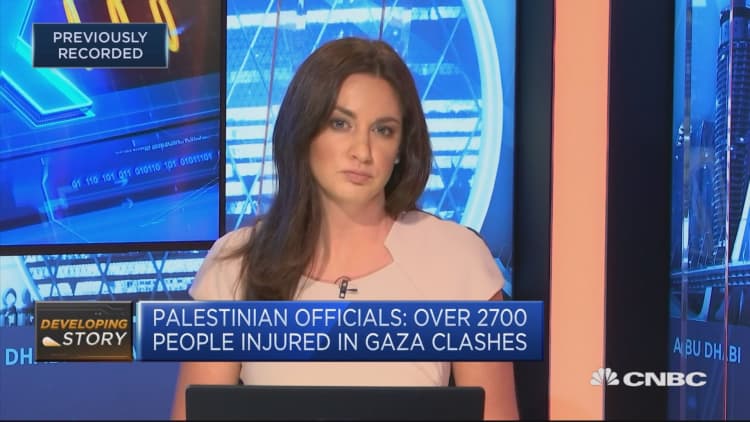The United States blocked a United Nations (UN) Security Council statement drafted Monday that called for an independent investigation into the deaths of at least 58 Palestinians along the Israeli-Gaza border.
Monday's violence followed several weeks of mass protests in the Israeli-blockaded territory of Gaza, which is governed by militant Islamist group Hamas. The unrest coincided with the opening of the U.S. embassy in Jerusalem, a Donald Trump administration directive widely condemned by the international community.
"The Security Council expresses its outrage and sorrow at the killing of Palestinian civilians exercising their right to peaceful protest," a draft of the statement read, which was seen and reported by AFP. "The Security Council calls for an independent and transparent investigation into these actions to ensure accountability."
The U.S. has used its veto power 43 times against UN resolutions concerning Israel.
More than 2,400 people were reported injured as Israeli Defense Forces fired live bullets into crowds of protesters, the majority of whom were unarmed. At least eight children under the age of 16 were killed, according to Palestine's envoy to the UN.
The draft statement also referred to the protests as "peaceful," a clear point of contention between opposing sides in the conflict. Israeli Prime Minister Benjamin Netanyahu on Monday called the killings an act of self-defense, blaming the violence on Hamas, which the U.S. designates as a terrorist organization. The claim was echoed by the White House.
"The Hamas terrorist organization declares it intends to destroy Israel and sends thousands to breach the border fence in order to achieve this goal," Netanyahu wrote on Twitter. "We will continue to act with determination to protect our sovereignty and citizens." Since the 1990s, hundreds of Israelis have been killed in terrorist attacks carried out by Hamas.
Jerusalem embassy opening
Monday represented the bloodiest day of the Israeli-Palestinian conflict since Operation Protective Edge, Israel's invasion of Gaza in 2014, which was launched in response to Hamas rockets fired across the Israeli border. That conflict saw more than 10,000 Gazans and 70 Israelis killed.
Fighting erupts every few years in the poverty-stricken Gaza Strip, but clashes hit a multi-year high Monday as Ivanka Trump and Treasury Secretary Steven Mnuchin inaugurated the new embassy in Jerusalem, which both Israelis and Palestinians see as their spiritual capital.
Trump in December broke with decades of U.S. foreign policy, declaring Jerusalem the capital of Israel and enraging Arab and Muslim communities around the world. Shortly after the announcement, 128 countries voted in a non-binding UN resolution calling on the U.S. to reverse its move.
Broad international consensus does not recognize Israeli sovereignty over the entire city, and leaves the status of Jerusalem to negotiations. Palestinians envision East Jerusalem as the capital of their future state, and have been advocating for statehood — sometimes violently — for more than half a century.
Several European leaders on Monday expressed concern over the violence, reiterating their support for a "two-state solution."
Trump pledged the embassy move as part of his campaign, as well as pledging an ambitious plan for Middle East peace, for which Monday's events don't bode well.
But this seems to have been lost on the White House, whose spokesperson Raj Shah said: "The actions today, both the opening of the embassy in Jerusalem and these tragedies in southern Israel, we don't think will impact the peace plan." It was the first time a U.S. official referred to Gaza as "southern Israel."
More than 40 Palestinians had already been killed during six weeks of "right to return" protests culminating on May 15, which for residents of the occupied territories marks the day they lost their land and homes during the establishment of the Israeli state.
Decades of conflict
Some 5 million Palestinian refugees remain eligible for services under the UN Relief Works Agency and qualify as "persons… who lost both home and means of livelihood as a result of the 1948 conflict." Some 1.5 million live in 58 recognized Palestine refugee camps across the Levant region, including in the Gaza Strip.
The Palestinian territory of Gaza was occupied by Israel following the Six-Day War of 1967, which saw the nascent state capture the Gaza Strip, West Bank, Syria's Golan Heights and the Egyptian Sinai Peninsula. The Sinai was eventually returned to Egypt in 1982. Though Israeli troops left Gaza in 2005, Israel still retains control of Gaza's airspace and coastline, leading the UN to continue referring to it as an occupying power there. The annexations remain controversial, and have continued to affect regional geopolitics to this day.
Gaza's 1.8 million residents live in the small 225 square-mile enclave, making it one of the most densely-populated territories on earth. Thirty-nine percent of the population lives below the poverty line, more than half lack access to reliable electricity, and unemployment stands at 42 percent, according to the UN.



